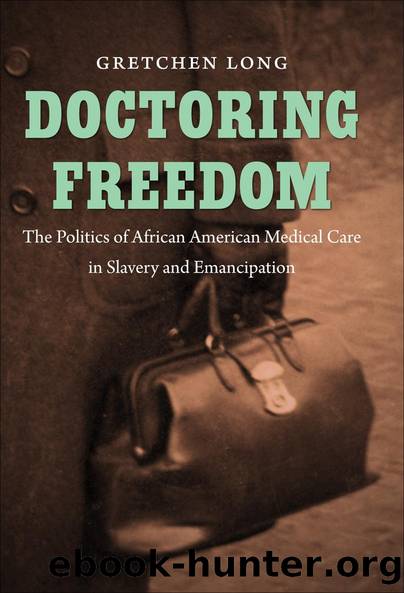Doctoring Freedom by Gretchen Long

Author:Gretchen Long [Long, Gretchen]
Language: eng
Format: epub
Tags: History
ISBN: 9780807835838
Google: K4zru7Dc5W8C
Goodreads: 13790968
Publisher: Univ of North Carolina Press
Published: 2012-01-15T02:42:52+00:00
In July 1866, Moses Camplin wrote to the Freedmenâs Bureau about his struggles to practice medicine as a newly freed black man in Charleston, South Carolina. Although this is the first record of Camplinâs contact with the Bureau, his name does appear in at least one other Civil Warâera document. A biography of Martin Delany, an African American activist, writer, and Union army recruiter, described a meeting of âcolored citizens of Charleston, South Carolina,â who convened on 29 March 1865 to draft a resolution celebrating their freedom and honoring Union commanders and President Lincoln.8 Moses Camplin, enslaved until shortly before this date, was listed as the chairman of the colored citizensâ committee.9 Camplinâs election as the chair of this committee one month after Charleston African Americans received their freedom bespeaks a number of aspects of his past as a slave and his view of what life would hold for him as a free man. Most obviously, his election to head the group shows his standing and respectability in the antebellum enslaved African American community. His chairmanship of the committee also indicates Camplinâs immediate investment in long-lasting and meaningful freedom for ex-slaves. Through his public leadership of the committee, Camplin showed his faith in the Union victory. He clearly saw his emancipation as a signal for participation in Charleston civic life. Camplin made an immediate stand as a free man and demonstrated his belief that organized groups, political awareness, and a forthright celebration of freedom were paths to political and economic power for Charlestonâs African Americans. If some African Americans felt it more politic not to embrace freedom outright for fear of reprisals, Camplin was clearly not in such a camp. Indeed, as his letter to the Bureau showed, he was a believer in a transparent and liberal notion of the state, regulatory functions, and the practice of medicine.
The date 18 February 1865, a month before Camplin chaired the colored citizensâ meeting and a year and a half before he wrote his letter to the Freedmenâs Bureau, marked the reversal of Charlestonâs racial hierarchy. Charleston fell that day, and Leeâs surrender was not far off. The date retained its significance for Camplin in the way he charted and remembered his emergence both as a professional doctor and as a free man. In July 1866, Camplin addressed the federal Freedmenâs Bureau with his problem. He wrote that he had worked as a âservantâ in the office of Dr. Thomas L. Ogier, âwhere,â he stated, âI studied and practiced medicine without molestation.â Camplin used the word âservantâ as many antebellum whites did to refer to a slave who was property. Camplin clarified his status in the letterâs next sentence, which referred to 18 February. He stated that it was âthe 18the day of Febrây 1865, when I received my freedom from the said Dr Ogier, and two weeks after I opened an office of my own.â In the opening sentences of Camplinâs letter, he equated his own background and skill with that of practicing white doctors in Charleston.
Download
This site does not store any files on its server. We only index and link to content provided by other sites. Please contact the content providers to delete copyright contents if any and email us, we'll remove relevant links or contents immediately.
Psychiatry and Racial Liberalism in Harlem, 1936-1968 by Dennis A. Doyle(150)
The Cure for Women by Lydia Reeder(140)
Doctors of Deception : What They Don't Want You to Know About Shock Treatment by Linda Andre(139)
The Daly Dish Bold Food Made Good by Daly Gina;Daly Karol;(128)
The Stem Cell Hope by Alice Park(124)
Doctoring Freedom by Gretchen Long(119)
9781836207139 by Miguel Gonzalez(118)
How Not to Study a Disease by Karl Herrup(114)
Tissue Engineering: Principles and Practices by Fisher John P(111)
Pharmaceutical Medicine and Translational Clinical Research by Vohora Divya;Singh Gursharan; & Gursharan Singh(111)
How We Became Sensorimotor: Movement, Measurement, Sensation by Mark Paterson(109)
Proper People: Early Asylum Life in the Words of Those Who Were There by David Scrimgeour(102)
A Secret Mind by Kaye Kelly(102)
Mary Putnam Jacobi and the Politics of Medicine in Nineteenth-Century America by Carla Bittel(101)
Summary and Analysis of Patient H.M. by Worth Books(99)
Medical Applications of Beta-Glucan by Gürünlü Betül;(95)
Women Doctors in War by Judith Bellafaire; Mercedes Herrera Graf(92)
The Right Carb by Nicola Graimes(86)
The Changing Face of Medicine : Women Doctors and the Evolution of Health Care in America by Ann K. Boulis; Jerry A. Jacobs(84)
